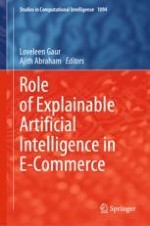2024 | OriginalPaper | Buchkapitel
Decoding the Recommender System: A Comprehensive Guide to Explainable AI in E-commerce
verfasst von : Garima Sahu, Loveleen Gaur
Erschienen in: Role of Explainable Artificial Intelligence in E-Commerce
Verlag: Springer Nature Switzerland
Aktivieren Sie unsere intelligente Suche, um passende Fachinhalte oder Patente zu finden.
Wählen Sie Textabschnitte aus um mit Künstlicher Intelligenz passenden Patente zu finden. powered by
Markieren Sie Textabschnitte, um KI-gestützt weitere passende Inhalte zu finden. powered by
